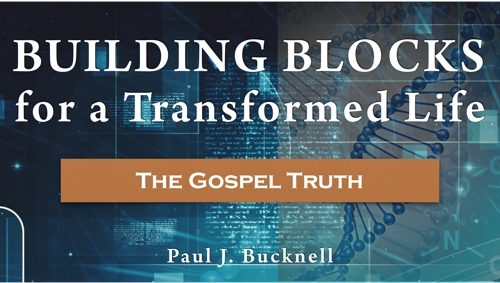
BUILDING BLOCKS
for a Transformed Life
The Gospel Truth
Paul J. Bucknell
Index
The Gospel Truth | Video and Study Questions
Check the D2 Digital Library for the full resources!
“For Christ also died for sins once for all, the just for the unjust, so that He might bring us to God, having been put to death in the flesh, but made alive in the spirit” (1 Pet 3:18 NASB).
So what is the gospel?
The answers to this question are many, but frankly speaking, not many can confidently answer one of the most important questions for mankind, "What is the Gospel?" Most would connect it to something good happening because of God's favor but would miss the far-reaching power of the Good News to be proclaimed.
Peter wanted to make sure everyone knew what the Gospel facts were and listed them off, one after another, in 1 Peter 3:18. The Gospel is more than some simple formula to say or quote or even pray, it is a mindset or understanding of the world and ourselves being condemned together. I'll list the eight different truths composing the gospel as found here:
• Christ Jesus physically died
• He died only once (effective)
• We, the unjust (all of us), deserve judgment
• Being unjust, we don’t deserve His kindness
• Christ’s death was a substitutionary atonement (propitiation)
• Christ’s painful death was purposeful
• God’s plan brings us (believers) to God (reconciliation)
• Jesus overcame death by coming back to life (resurrection)
And so, if we strip the theological terms away, we find that God shares His perspective of our wayward lives deserving a great judgment and how He could help out mankind to restore man to where God originally placed Him–at His side. This is the good news indeed, being restored to God and like Jesus be filled with His Spirit to do God's good work for His glory.
How does the Gospel save?
If the gospel is not clear, how one is saved is even far worse. In other words, we have the facts of the Gospel listed above, but knowledge of them does not save. The truth does not save us on our own. We will be the miserable of creatures to discover on Judgment Day that though we knew the truths of the Gospel, we had not yet applied it to our lives.
Truth is essential for salvation but knowledge is only one part and must be accompanied by believing faith to become effective unto salvation. The big question is, "How to get that salvation?" How does one move from knowledge to belief? Some put their confidence in going to the front altar while others in raising one's hand, but the scriptures say nothing of this. It is the belief that Jesus has taken away our sins, indeed has died for our very sins and suffered for us and then raised from the dead that lead us through salvation's door. So we need truth and faith for salvation.
=> Video and Study questions
info@foundationsforfreedom.net
Scriptures typically quoted from the New American Standard Bible unless noted:
(C) Copyright The Lockman Foundation 1988










